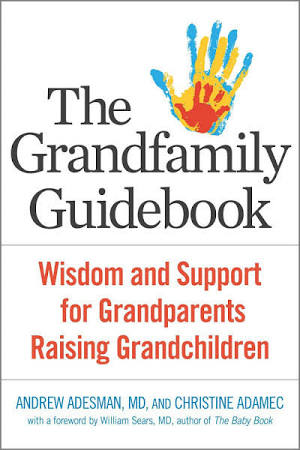What is a grandfamily? It’s a family unit in which a grandparent (or sometimes two grandparents) is the head of household and is also actively parenting one or more grandchildren.
Grandfamilies are often formed under stress. Grandparents may step in as the result of a crisis, such as a parent’s arrest, substance abuse, or children being removed from the home because of child abuse or neglect. Someone must immediately take charge of the children, and so the grandparents decide they will now assume this role. Whatever the reason, it’s very scary and very stressful.
If you find yourself raising your grandchildren—perhaps with very little notice—you might feel disoriented at first. This isn’t what I expected to be doing at this stage of my life! Do I have the energy for this? You might miss your past role of a “normal” indulgent grandparent—someone who said yes to nearly everything, from an extra cookie to a spontaneous trip to the zoo. Yet this is not a role you can maintain when you take on the responsibilities of daily parenting. And you might feel alone, perhaps out of step with the much-younger parents around you. But in fact, you’re not alone. Far from it: millions of children around the world are currently being raised by their grandparents. While grandfamilies are often formed in crisis situations, they are also built and strengthened over time.
We wrote The Grandfamily Guidebook as your companion and guide through the whole grandfamily process—from the stresses of shifting dynamics to the everyday joys shared with your grandchild. In this excerpt, we’ll discuss how to explain your new “normal” to the child you’re now parenting.
Explaining to a Child’s Level of Understanding
“What happened to my first mom and dad? Why am I living with you instead?”
The explanation needs to be tailored to the child’s level of understanding, which differs dramatically depending on whether the child is three years old, ten, or an adolescent. It also needs to be tailored to the particular child’s maturity level. Very simple and upbeat explanations are often sufficient for a young child, but the true picture needs further layering and sophistication as the child grows older and has more questions.
At every level of understanding, however, it’s important to say that it wasn’t the child’s fault in any way that the birth parents aren’t raising the child. Even young children may wonder if they cried too much or did something else wrong. Maybe you can’t imagine how children possibly could blame themselves when they are completely blameless. Yet children seek explanations for their life situations, and if none are forthcoming, they may come to the wrong conclusions, including self-blame. This is human nature. After all, it is very unlikely that parents are to blame for their adult child’s poor choices. Yet many parents agonize, especially at first, over how they might have caused their adult child to become addicted to drugs or to commit crimes. Children are even less able to dissociate themselves from the cause of a problem. Children are also more self-centered than adults. Thus, they reason that they must have done something wrong to be rejected by their parents.
The Preschool Child (four to five)
To very young children, we might say that they grew in their birth mother’s “tummy,” but then moved in with their grandparents, who were so happy to have a wonderful little child to live with them. Their birth parents brought them into the world, but then something happened so that the grandparents needed to take charge of the children. Preschoolers cannot understand concepts like substance abuse, addiction, mental illness, incarceration, death, abandonment, or adult immaturity. They can, however, understand that some people can’t do a job very well. Their birth parents couldn’t do a good job as parents, so the grandparents, who were very experienced at raising children, became the preschoolers’ caregivers. Many children can also understand that it wasn’t their fault that their parents couldn’t raise them, nor was it their grandparents’ fault. But be sure to tell them this.
The Elementary School-Age Child (six to 12)
School-age children likely know where babies come from, so you might substitute “uterus” for the “tummy” where the child grew inside. These children may also learn in school that illegal drugs are harmful, causing sickness or addiction, and they may even sign pledges to never take drugs. They may also learn about mental illness in school. You can explain that some parents need to take a special kind of medicine to think clearly, use their skills, and be good parents. But if they don’t take the medicine, they can’t be good parents. (Often people who are mentally ill refuse to take their medication because of the side effects, such as tiredness, mood problems, or weight gain. Cost can also be a factor.) This may prompt the question, “Why didn’t my dad take the medicine?” You could say that you are not sure, or that the birth parent didn’t think it was really necessary or provide another explanation. Many children will then ask, “Why didn’t you make my mom take the medicine? You are still her parent.” Here you might respond that adults decide whether to take their medicine, and parents can’t make grown-up children take medicine, even if they wish they could.
The Adolescent (13 to 18)
Teenagers may see themselves as very mature people indeed, but surging hormones and major body changes can make it difficult to think clearly sometimes. Teenagers can also be very critical and judgmental toward both their birth parents and grandparents. For example, they may ask if their birth mother was a drug user, why didn’t she go to rehab and get herself straight? Or why didn’t the grandparents force her into treatment? If the birth father was in trouble with the law for multiple crimes, why didn’t he stop getting into trouble and pull his act together? Also, why didn’t the grandparents make the birth father act like a responsible adult? Grandparents need to explain that adults make their own choices and, sadly, sometimes they make choices that are not conducive to parenting children. And parents cannot force their adult children to make good choices.
If the state or county child services agency was involved in the children’s removal from the birth parents’ custody, the grandparents may wish to tell teenagers that they were removed from the home because of abuse or neglect. Often the abuse or neglect was directly linked to the abuse of alcohol or addictive drugs.
Think Again: Avoid Unhelpful Explanations
As children grow up, you’ll need to revisit the story of how your grandfamily came to be, helping them understand and accept it more thoroughly. As with many complex topics, such as talking to your children about sex, adoption is not a simple story that is told a few times and then, whew, the parents are relieved it is over. Instead, the story about why you adopted and are raising your grandchildren needs to be explained very simply when children are young, and then later it should be overlaid with more details. Let’s look at some of the common mistakes grandparents make when explaining how the grandfamily came to be.
Think Again . . . If You’re Avoiding Explanations Unless the Children Ask for Them
Let’s not assume that if children don’t ask questions about their family situation, it means they don’t have any questions, ever. Some children might have trouble formulating a question. Others may be afraid to ask because they fear upsetting their grandparents. (They may be trying to protect your feelings!) So it’s wise to open up the subject once in a while:
“Sweetie, we’ve talked about how you came to live here with us when you were younger. Do you ever wonder more about what happened? Do you have any questions?” You’ve given the child an opening to ask about it, now or in the future. When children don’t have answers to their questions, including the unasked ones, they make up their own answers to fill in the gaps. And their imagined answers may be more disturbing than what really happened.
Think Again . . . If You’re Sugarcoating the Story
Many grandparents want to sugarcoat or altogether avoid the adversity that is almost invariably connected with children being raised by their grandparents rather than their birth parents. Yet it’s important to keep in mind the way children think when these stories are told. For example, some grandparents may tell children that their birth parents asked the grandparents to raise the children. That might be true, but it’s not enough. Why did the birth parents ask the grandparents? Even if children don’t ask that question, they are certainly thinking it. And if it’s not addressed, children may think that it was somehow their own fault. They may believe that in some way they just weren’t good enough—and that’s the last thing you want them to think. You need to gently explain the birth parents’ problems at a level the children can understand.
Think Again . . . Before Saying the Children Are with the Grandparents Because the Birth Parents Really Loved the Children
If we simply tell Billy that his birth mother loved him so much that she gave him to his grandparents to raise, that’s also avoiding the issue. Billy may then wonder if the grandparent might place him with someone else—because we love each other too, right?—equating love with loss. True, the birth parent did love Billy, but that’s not the main reason he’s living with you now. Instead, for some reason, the birth parent could not handle the job of parenting Billy, and that’s what you need to explain, in simple terms.
Think Again . . . Before Saying the Birth Parents Were “Bad”
The birth parents of your grandchildren may have emotionally harmed you deeply by their behaviors, whatever the reasons they couldn’t or didn’t choose to raise their children. One of these birth parents was your own adult child, and it often hurts—a lot—that you can’t be a “regular” grandparent. Nevertheless, don’t paint the birth parents as bad people to your grandchildren. If the birth parents had problems that prevented them from parenting their children, it was their behavior that was problematic, such as abusing substances or committing crimes. This is what you need to stress.
Here’s why: Your grandchildren know they were born to their birth parents. And if their birth parents are depicted as “bad guys,” then does that mean the grandchildren are bad too? Avoid this interpretation by staying away from the bad-guy explanation.
This is easy to advise but may be hard to follow sometimes. When your daughter is pregnant again, and you know she can’t raise child number four, it’s hard to refrain from making critical comments about her irresponsibility. But do keep those comments to yourself, or strictly among the adults in the family (and remember, children love to eavesdrop).
It’s very painful for parents when their own adult children aren’t good parents, but it’s best to keep at least some of the pain away from your grandchildren.
Think Again . . . Before Describing the Birth Parents as Too Poor to Raise a Family
Yes, money may have been a problem for the birth parents. But rarely are finances or even joblessness the bottom-line reason that parents give up or otherwise lose custody of their children: there’s usually an underlying issue (substance use or gambling, for example). And if children think that money was the reason, what if they later hear you talk about how money is tight this month? Will that mean that the children must go elsewhere? Grandchildren are also likely to wonder why their grandparents didn’t simply help out their birth parents. Being told that they’re not living with their birth parents because they were poor may lead children to feel confused or distrustful of the adults around them.
Think Again . . . Before Describing the Birth Parents as Too Sick to Raise a Family
Framing the problem as sickness can also be misleading—unless the birth parent has a progressively debilitating condition or a terminal illness. The children may wonder, Why didn’t my grandparents—or doctors—help my parent get better? Perhaps in reality, however, the birth parents were “too sick” because they were abusing drugs or were mentally ill, and they didn’t listen to guidance from the grandparents, or doctors, for that matter. If young children are told that their birth parents couldn’t be good parents and keep them safe, that explanation usually is sufficient. Later, more information can and should be provided.
“Aren’t You Too Old for This?”
Many people will be curious about why you are constantly with the child. Are you raising the child yourself? One simple answer is, “Yes, I am.” But the questioning is unlikely to stop there. There may be a range of follow-up questions, from amusing to annoying, that can be tough to answer. This chart offers you a few suggestions.
| Comment | What a Grandparent May Think | What a Grandparent Could Say Instead |
| “It must keep you so young, raising a child again!” | Yes, tell that to my arthritic knees and my aching back. | “It’s a challenge, but I do my best.” |
| “You must be a saint! I’d never want to be a parent again.” | I really didn’t want to either, but my son’s heroin addiction made it an urgent priority. | “Many people step up to do what’s needed, and I am one of them.” |
| “Why aren’t his parents raising him?” | Why don’t you mind your own business? | “That’s a private matter.” |
| “Who’s going to raise her if you die before she’s grown up?” | Are you really asking me this question? | “We have a plan for that.” |
| “Maybe his parents will straighten out and take over the parenting again.” | Sure, when pigs fly. | “We’ve adopted Jimmy, so we are now his parents.” |
| “Do you take him to basketball practice and do all that other stuff?” | What do you think we do, read AARP magazines to him and play shuffleboard? | “Yes, we do. And we cheer as loud as the other parents.” |
| “I could never do what you do.” | I’m not entirely sure how I am doing it! | “Sure, you could, if it were your grandchild getting placed in the foster care system.” |
| “Does she miss her mother?” | That question is so out of line. | “I don’t really know, but I imagine so.” |
| “Why don’t you adopt him?” | We would if we could. | “Maybe someday we will.” |
| “Does it feel weird to be your age and raising a child again?” | It feels sad, stressful, and often very joyous. | “It feels like we’re doing the right thing.” |
| “If you die, will his parents get him back again?” | Considering their history of child abuse and drug addiction, I’d say no. | “It’s hard to tell.” |



